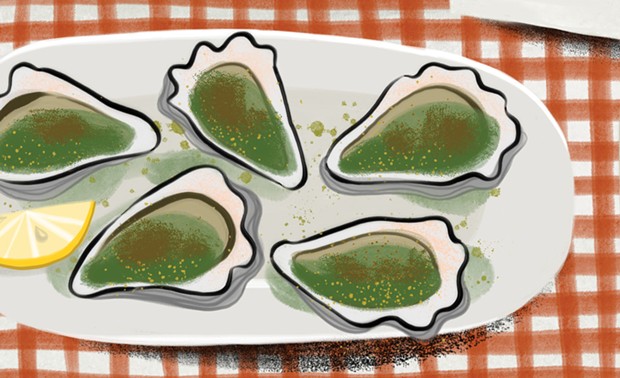[
{
"name": "Top Stories Video Pair",
"insertPoint": "7",
"component": "17087298",
"parentWrapperClass": "fdn-ads-inline-content-block",
"requiredCountToDisplay": "1"
}
]
The Journal's annual 99-word Flash Fiction Contest reminds us how we live moment to moment, not always in big stories or epics, but in little scenes and memories — funny, terrifying, haunting or everything at once. Steadfast judges joining me on the emotional roller coaster this year include: JoAnn Bauer, retired children's librarian; David Holper, first Poet Laureate for Eureka and College of the Redwoods faculty emeritus; Jennifer McFadden, owner of Booklegger; and retired Booklegger co-owner Nancy Short. Consume and be consumed by these tiny tales from talented fellow Humboldtians as you will — all at once or moment by moment.
This is the Story of How
1979 was a Rough Year.
By Kristi Patterson
I lost two grandparents — one to suicide, one to cirrhosis. We spent Christmas at the Eureka Inn instead of at home.
My parents could not dissuade me from ordering oysters Rockefeller.
I took a horrified bite of green goo.
"How is it?"
My eyes welled up. "Great."
My dad took a taste. "That's just awful!"
I burst into tears. "I know!"
The whole table exploded in the laughter of the grieving.
This is the story of how my dad and I each ate half a plate of turkey dinner, and how my family survived.
The story is remarkably complete. The opening line gives us a heartbreaking backstory, and just a few more sentences we see the unfolding of dashed expectations and the release that laughter provides for the grieving. This moment pivots a wounded family toward survival. — Jennifer McFadden
Though not directly about the pandemic, this vignette reveals how humor can serve as an antidote to grief and to those crazy moments when families have to figure out how to cope. — David Holper
Reading this in a rough year of our own, peppered with loss and adjusting our celebrations to fit our new reality, this small moment resonates with hope. The failed culinary adventure is funny and the family's first laugh in the daze of grief is rightfully framed as a turning point. — Jennifer Fumiko Cahill
The Potato
By Alan Sanborn
I swear the potato looked just like Uncle Bert. Uncle Bert didn't find that too funny. He got so pissed he pulled the .30\06 off the wall. It was pointed at me when Travis tried to grab it away. Somehow a hole got blown through Netty's bedroom wall.
"What the fuck!" blasted Travis.
Uncle Bert shot back, "I's just messin' with you. Didn't know it was loaded."
Coulda been worse. The only one wounded was the damn potato. It got trampled underfoot in the scuffle.
"Hey Bert," said Travis, "it don't look like you no more."
A compelling story that blends the strange nature of family dynamics with humor, a .30/06, and a potato that looks like Uncle Bert. Or at least used to. — David Holper
A cautionary tale of tempers and tubers that goes from funny to scary and back to funny in 99 words. — Jennifer Fumiko Cahill
I Do Draw the Line
at Disco, Darling
By Stephen Kamelgarn
On April first, Reginald (Reggie) Barker, activist and heir to a vast fortune, consciously and deliberately made the decision to go mad. He had assiduously studied the issue for many years, deciding that assuming the mantle of madness was the only rational response a person of conscience could make to the world-wide insanity surrounding him. He needed to make a political statement explaining his motives, and called a press conference to make his long-awaited announcement.
When a reporter asked how far he was willing to go in his madness, he replied, "I do draw the line at disco, darling."
I love the unexpectedness of the last line. It reminds me of one of my father's favorite jokes with the punchline "I may be crazy, but I'm not stupid." — JoAnn Bauer
I Stand with the Plutonians
By Garrett Snedaker
Fifteen years is a long time for resentment to build, so I can understand the impetus for my abduction. They don't appreciate their home being treated as a second-class planet. I empathized but said I don't have any say in such matters. Apparently I was just the first Earthling they encountered. If you're fortunate enough to get picked up, you'll see that Pluto is cold but stunning, a marvel of a marble. And I can't complain. They didn't mistreat me and I enjoyed a bit of space travel without being an asshole billionaire.
I, too, was distressed when Pluto was demoted from full planet status and I love the matter of fact tone the narrator uses in describing his intergalactic adventure. — JoAnn Bauer
Of all the alien abduction stories we've read for the Flash Fiction Contest, have we ever seen one where the experience was ... fine? Pluto will always be a planet in our hearts. — Jennifer Fumiko Cahill
Barry
By Alex Grimm
Barry shoplifted, though grandpa bought him candy and grandma bought him underwear. When his dad was sober, he'd stop in with manga and a used video game for the PlayStation 4. His mom was doing time, but she mailed him hand-painted art for his room at his grandparents' house. The shrink said Barry stole because of his messed up parents and the loot was his way of self-soothing. Really — Barry felt quite loved.
At 14, with a backpack containing stolen Beefaroni, cops arrested him.
That night, Barry's alcoholic older brother curled up under a tree with an empty stomach.
This piece sets up our curiosity about why Barry shoplifts — only to provide us an unexpected twist in a way that completely changes our attitude to him. — David Holper
The Nail Shop
By Alan Sanborn
Witness: In shop just do nails. No do sex. No mens come in.
Prosecutor: This isn't about prostitution. Does this man, your boss, demand sex to keep your job?
Witness: You doh understand. You doh know Bangkok, Nana Plaza. Dis one, he good man. He doh put me in room, lock door. He doh beat me. Doh sell me more men, doh take my money. Dis America. I free. I hehf apartment. I even go beach. I hehf friends. I go hehf tea. Meet friend — hehf coffee. Someday maybe own store. He good man. He doh beat me.
It is tricky to portray an accent or dialect in writing. I feel this writer has pulled it off and illuminated a situation and a character. While attempting to defend her employer, this speaker exposes his exploitation of her, and reveals that she has seen much, much worse. I came away respecting and liking this survivor. — Nancy Short
Look at me.
See what I can do.
By Harmony Mooney
My pockets are full of barley and oats.
I am sweating sunshine. The boots on my feet don't let any moisture in or out and it has been five years since you last spoke to me.
But here I am still waiting for you to notice what a good job I've done on this harvest. What a good job I've done making all your dreams come true.
My cabin has some warped floorboards but everything is clean. I built it myself.
My palms are covered in dirt. See what I can do.
This piece evokes the troubled relationship between what seems to be a parent and their adult child. The author's choice to leave out whether the parent is alive or not only makes this piece stronger, leaving the adult child wanting someone — or anyone for that matter — to notice everything they are doing to be worthy of respect. — David Holper
This story hints at a drama, a loss, with the benefits of good boots expressed in the same breath as a five-year separation. But it's the narrator's labors of devotion, of the hard work that express their love and their hope to be seen, whether reunion is possible or not, that move us. — Jennifer Fumiko Cahill
Escape
By Cecilia Holland
My kids. My kids.
Her son clung to her hand. In the crook of her other arm the baby whimpered. She could hear the men crashing through the brush behind her, and a dog bugled.
She waded into the dark rushing river, her breath short at the icy cold. Up to her knees, now her waist. Her son wrapped his arms around her neck. Behind her, somebody yelled. She staggered in the current. The bank loomed over her.
From the brush on the bank an arm stretched toward her. Whose? She didn't know. She reached for it anyway.
Please.
At first reading, I envisioned a runaway enslaved woman, but it could be any refugee fleeing an impossible situation. I hope the outstretched hand belongs to someone with the will and ability to take this family to a safe haven. — JoAnn Bauer
The stakes are high in this tense story of a woman fleeing from known danger with her small children, and having to take a chance on the unknown. The choice is terrifying but a leap of faith is her only option. As she silently pleads, "Please," the reader is right with her. — Jennifer McFadden
Respect
By Jenny Lovewell
It pissed him off. Weeks ago they moved out of their old house and settled in another town. Now he wanted her to stop harping about the sea glass left behind in an upstairs window. He couldn't understand her attachment to stupid bits of colored glass. They were just garbage, pieces of jars and bottles from a century-old dump in the cove.
She would never tell him that such broken relics, shattered and bullied by the indifference of rough tides, could still shine when placed in the right light, and they helped keep her hope alive.
With just a few well-chosen words and images, I was given a glimpse into a painful relationship and the heart of a woman. I don't think I'll ever look at sea glass in the same way again. — JoAnn Bauer
This brief narrative not only draws our sympathy to the female protagonist but it also uses the metaphor of sea glass to suggest how this woman is being worn down by her husband — and yet becoming something beautiful even amid such pain. — David Holper
My Mother's Mouth
By Daniel Zellman
We were seated between them on the couch when our broken world broke more. "Sometimes mommies and daddies stop loving each other," one of them said.
My sister cried and ran out of the room. "I wanna go with Dad!" I shouted. "I wanna go with Dad!" I can still see my sister's tears, my father's hands, my mother's mouth. I can still see the way the sun shone on the floor the day the world broke more.
"My Mother's Mouth" portrays the moment a child's world, already "broken," is changed forever. A parental separation shakes up everything for this family, and the narrator reveals his or her own contribution to the ruinous scene: choosing sides. The title reinforces what resonates in the narrator's memory, the reaction of the parent not chosen. — Nancy Short
The Cost of Rising
By Joe Shermis
It took George years to learn how to levitate and, when he finally got the hang of it, he found the skill was not as useful as in his dreams. Sure, people would watch in wonderment and, occasionally, when he stayed under 6 feet, ask questions. Sometimes when he lighted back on the ground, they would clap, but no one offered any earning opportunities for the skill. His hopes had been high, but all that spiritual discipline was for naught; mostly George would get carried away and fly off to where the views dazzled and the air was crisp.
The writer shows us a shallow, greedy narrator, who, despite his stubborn intentions, seems to be becoming a more spiritual person. The "cost" of his spiritual practice is to lose, slowly and subtly, his materialistic nature. — Nancy Short
Happy Ending
(a tribute to Oscar)
By Lauri Rose
Dusk reaches out, touching the spotted fawn where she lies. Obeying instructions from deep within, she never moves. Waiting for the doe to come home. Waiting.
The moon high in the sky and hunger deep in her belly. Still, not even a twitching nose reveals her to predators.
The slow-coming dawn brings no mother. Now the hunger draws her forth on shaky legs. Across the fence she smells milk. Bleating, she finds her way to the swollen teat. In the strange way of nature, the nanny who lost her kid takes on the fawn who lost her mother.
Am I a softy for animal happy endings? Maybe. But this story also feels very human — a metaphor for the rescuing power of found families and unlikely bonds — without anthropomorphizing the animals, showing us the instinctual nature of coming together after loss. — Jennifer Fumiko Cahill
Transformation
By Carolyn Lehman
It was Christmas Day. She stood at her parents' front door, which was tied up like a present in the same sad, plaid plastic bow. Classic Christmas carols misted the air.
Her counselor had warned her that things might not have changed inside, despite her mother's terse "love u," texted without her deadname. They might not be ready to open their hearts, although she had forgiven them the pain they had caused.
Where once she had slipped out in secret, looking to meet other girls like herself, she now knocked, willing to believe in the possibility of miracles..
This Christmas story encapsulates the hope and dread surrounding painful family rifts that can reopen — or be healed — at holiday get-togethers. The author describes a protagonist on the verge of discovering whether her family will support her or condemn her. I appreciate the universal nature of this kind of tension, and the way the author subtly drops in the specifics of this protagonist's story. — Nancy Short
Transformations and miracles take many forms, but the desire to be seen and accepted for who we are is universal. I am rooting for this character, waiting to see what happens when the door opens. — Jennifer McFadden
Stories of coming out and of gender transition are often so complex and layered with family history. This one gestures toward those details but interestingly stays in the seconds this woman spends on the precipice before taking the leap of faith that her family will embrace her. — Jennifer Fumiko Cahill
Who Was She?
By Dylan Ray Berman
I saw her biking last winter. My fingers were hurting in the cold.
Her cheeks were blushed, half buried in a brown jacket, the brittle kind with white fur. She was blonde.
We were going the same way, her in front of me and faster. I pedaled harder because I hoped we'd meet.
I wouldn't have talked to her, I had stupid hair from when I buzzed it in spring, and my words would come out wrong. She was gone when I turned the corner past some eucalyptus trees onto the road full of stoplights and new cars.
This musing on a missed connection is all in the details. The narrator's vulnerability, uncertainty and questions of what might have been loom in the last image "stoplights and new cars." — Jennifer McFadden
That Which
Money Can't Buy
By Walt Kelly
My Mercedes seemed a stallion among draft horses, sleek German steel parked with cheap lumpy metal. Stickbox houses, unremarkable neighborhood. I passed her Tercel in the driveway, knocked. A dog barked. I heard, "Jason! Quiet!" My name is Jason. She wasn't surprised.
She stared, said, "You found me. Well, your PI did. Come in, Dad." Decorated by Goodwill, dirt brown carpet, sad, old couch — nurse's pay, after all.
I implored, "Come live on the island!"
She looked out the window, said, "These people are ... alive." Then, "Try it. Move here."
Got a pickup now. The ulcer is gone.
This story illustrates the ineffable nature of revelation. The wealthy father arrives at his estranged daughter's humble home thinking only of all he could offer her. Her counter offer shocks him into realizing what he has been missing. This is the story of a miracle. The author dwells not on the process of transformation, but on its effect: The father has become a better, more fulfilled person. — Nancy Short
The Other Intruder
By Ella Ivan
The house was dark as I crept in. I had been watching them for weeks. I knew where to go. I crawled up the stairs to the bedroom and gently opened the drawer where I knew the jewelry was. I grabbed as much as I could and softly slithered out, bumping into someone on my way. Assuming it was the husband, I pulled my knife out, noticing the other person do the same. He was dressed in all black. Noticing the jewelry, he smirked. "Unlike you, I'm not here for the jewelry." He brushed past me into the room.
This account of a burglary takes an unexpected turn when the burglar meets a second intruder with different motives. The stage is well set for suspense, yet the encounter defies our expectations. — Jennifer McFadden
Wormhole for a Bookworm
By Adrienne Veronese
Christmas means books. It's always meant books. We exchange them and spend the holiday reading. Only something seems off about the one I got this year. I can't seem to stay awake long enough to nail down the plot. And when I wake up, I'm never in the same clothes I was in before I sat down. Just now I woke to find myself soaking wet; hair and all. But that's not the weird part. The weird part is it's grown halfway down my back. Before I sat down, I had a buzz cut.
It's always lovely to get lost in a book, but this takes it to a whole new level. — JoAnn Bauer
Jennifer Fumiko Cahill (she/her) is the arts and features editor at the Journal. Reach her at 442-1400, extension 320, or [email protected]. Follow her on Twitter @JFumikoCahill.
Speaking of...
-

Short Stories, Police Shooting, Pelican Bay and a Potluck
Dec 3, 2023 -

NCJ's Flash Fiction Contest is On
Oct 3, 2023 -

Flash Fiction Returneth!
Oct 4, 2022 - More »
more from the author
-
Eco Cemeteries, Flags, Impacts and Foods
- Apr 12, 2024
-
Sunken Seaweed's Dual Mission
Stocking shelves and the ocean with seaweed and kelp
- Apr 11, 2024
-
Alternative Energy Brainstorming with Billionaires
- Apr 11, 2024
- More »
Latest in News
Readers also liked…
-
Through Mark Larson's Lens
A local photographer's favorite images of 2022 in Humboldt
- Jan 5, 2023
-
'To Celebrate Our Sovereignty'
Yurok Tribe to host gathering honoring 'ultimate river warrior' on the anniversary of the U.S. Supreme Court ruling that changed everything
- Jun 8, 2023




































